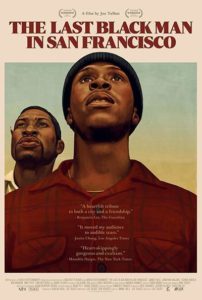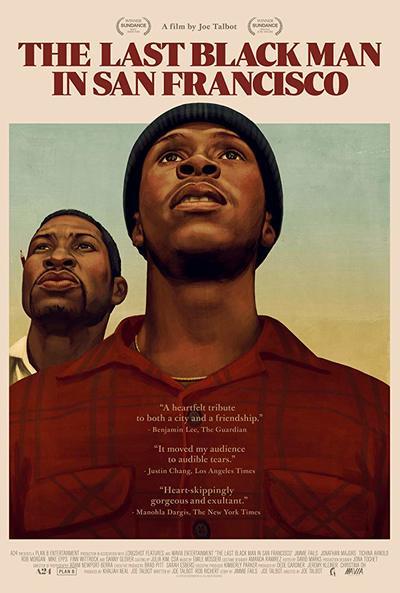The Last Black Man in San Francisco
Posted on June 13, 2019 at 5:34 pm
A-| Lowest Recommended Age: | Mature High Schooler |
| MPAA Rating: | Rated R for pervasive language, violence, sexual content, some drug material and brief nudity |
| Profanity: | Very strong language |
| Alcohol/ Drugs: | Drinking, references to drug abuse |
| Diversity Issues: | A theme of the movie |
| Date Released to Theaters: | June 14, 2019 |
| Date Released to DVD: | August 26, 2019 |

The movie Jimmie has a best friend named Montgomery (Jonathan Majors) who lives with his blind grandfather (Danny Glover). Jimmie has been sleeping on the floor next to Mont’s bed. Every two weeks, they visit the Victorian home Jimmie’s family once lived in. Over the strong objections of the middle-aged white resident couple (she objects more than he does, but she seems to be the one with a real ownership stake), they perform small touch-ups to maintain the trim, fixtures, and garden. The middle-aged white owners see it as intrusive (and possibly as criticism). But for Jimmie, who is determined to live there again some day, it is a chance to care for the house that is a legend in his family, built by his grandfather, and a symbol of an idea of home that seems to be gone for good.
The film creates a poetic, dreamlike mood that almost floats over the story, an astonishingly assured debut that trusts the story and trusts the audience to let us fill in the details and come to our own conclusions, especially refreshing in an era of multi-national financing where specifics are smoothed over and everything has to be explained two or three times to meet the expectations of an international audience.
Instead, here, we have the infinitely expressive faces of Fails and Majors, as eloquent as any performances you will see this year. We first see them waiting for a bus that never comes, as telling a moment as the entire text of “Waiting for Godot.” So they hop on Jimmie’s ever-present skateboard, the perfect freedom of their ride in tandem in sharp contrast to the restrictions they face everywhere else. We get glimpses of what has made the house so important to Jimmie in his encounters with his father and mother, each disconnected and making clear that those relationships are not able to give him any sense of home. We see Jimmie and Mont talking to a group of guys who hang out on the street tossing insults at each other and everyone else, their only way to create a sense of camaraderie and belonging. In one of the film’s highlights, he approaches the group with his own version of the dozens — some directorial notes about the meta-impact of what is quite literally their performances.
The residents have to move out of the house and, like the characters in the film, it falls into a kind of limbo. Jimmie knows this is his moment. He retrieves his family’s furniture from his aunt, who has been storing it, and returns to what he will always think of as his home.
In a film like this, the house itself has to be a character in the story, and this one is, a grand old place with a witch’s hat roof, a library filled with vintage leather-bound classics, an organ and a piano, and all of the original architectural finishings of the era perfectly preserved. We see a Segway tour go by (led by Jello Biafra), and Jimmie correcting him about the history of the house. This is a place for dreams to come true, including Mont’s dream of writing a play. Jimmie tells him the play will be performed in the house, and they invite everyone they know.
But a treasure like this house must go to someone who can afford it, and that is not the only terrible loss in the film. While Jimmie mourns what is gone, Mont mourns with him. The depiction of a deep and tender friendship between two men who are always sad, sometimes lost, seldom angry, and always open to love and beauty, echoes movingly throughout the story and the story-telling in this unquestionable cinematic masterpiece.
Parents should know that this film includes very strong language, some violence, family tensions and dysfunction, and graphic non-sexual nudity.
Family discussion: Why are Jimmie and Mont friends? How can communities prosper without pushing out lower-income residents? What do we learn from the guys on the street? Where will Jimmie go?
If you like this, try: “Blindspotting” and “Sorry to Bother You”



